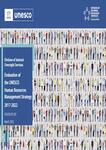Page Header

Downloads:
5
Evaluation of UNESCO’s Operational Strategy for Priority Africa (2014-2021)
Overview
The evaluation found that the relevance and the very existence of the Strategy was not challenged. There was overall agreement from all stakeholders that such a Strategy was necessary and that the flagship programme modality it promoted was indeed an effective mechanism that should be sustained. Nevertheless, Member States do not perceive the effects of this prioritization on the African continent. This disconnect between the ambitions of the OSPA and the actual implementation has mainly been attributed to insufficient integration of the OSPA objectives into the Organization’s overarching strategic frameworks (namely its Programme and Budget – C/5), which has hindered its uptake by the Programme Sectors charged with implementing it. As a result, despite a clear division of responsibilities in the Strategy, PAX is still considered the primary entity responsible for guaranteeing the OSPA’s implementation, rather than it being a common responsibility borne by all Sectors and an achievement for which every staff member should strive. The parallel reporting framework has also meant results achieved in the framework of the OSPA have not always been accurately reported as attributable to the OSPA but were only presented as an output of the Sectors’ expected results. Less visible, they were harder to measure and attracted less funding. The broad definition of the flagship programmes has further rendered their translation into specific actionable and identifiable activities difficult. Finally, although Africa is the region with the largest proportion of UNESCO staff, lack of resources (both human and financial) continue to hamper the capacity of Field Offices to effectively implement the OSPA.Report Details
| Year Published | |
| Type | |
| Joint | No |
| Partner/s | N/A |
| SDG/s | |
| Consultant name | |
| Agency Focal Point | Claudia Ibargüen |
| Focal Point Email | c.ibarguen@unesco.org |
| Managed by Independent Evaluation Office | Yes |
| Geographic Scope | Regional |
YOU 'RE READING
Evaluation of UNESCO’s Operational Strategy for Priority Africa (2014-2021)









